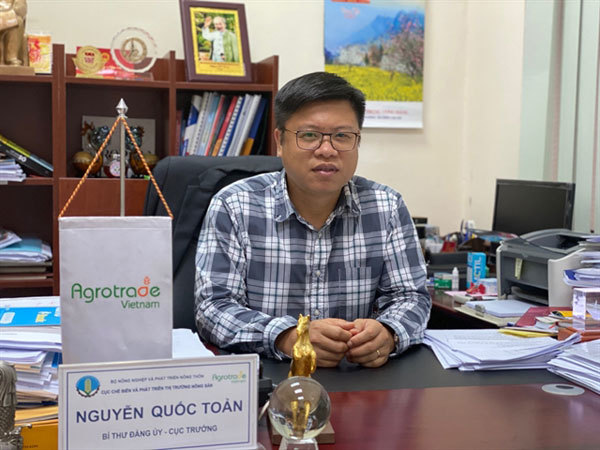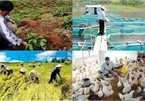talks to the Government portal chinhphu.vn on the need to develop the domestic market.
 |
| Nguyen Quoc Toan, director-general of the General Department for Agricultural Products Processing and Market Development. — Photo baochinhphu.vn |
What are the impacts of the domestic market on the consumption of Vietnamese agro products?
The domestic market always attracts great attention from Vietnamese State management agencies, as well as enterprises and farmers themselves.
In developed nations, the development of domestic markets is on equal footing with the development of overseas markets. Vietnam is no exception. The Government has instructed all concerned ministries and branches, particularly the Ministry of Industry and Trade, to develop a strategy for the domestic market to meet the big demand of domestic markets – particularly Vietnamese consumers.
The quality of the products is a very important element in food safety. Our Law on Food Safety has well been implemented while the public campaign calling on Vietnamese people to eat Vietnamese produce has been well carried out nationwide.
What is the role of the wholesale market in the consumption of agriculture products?
Vietnam has some 30 wholesale markets nationwide, of which 17 are located in urban areas. It is estimated some 300 tonnes of products are transacted in these markets.
In Vietnam, wholesale markets are important places to promote domestic consumption. Yet products sold in these markets are not yet diversified. This is food for thought for authorities. These markets should also be a venue for domestic consumption and export.
What are the bottlenecks in the domestic consumption of agro-products?
The network of supermarkets and wholesale markets in our country has not been fully developed and products sold there are not diversified. Most of the supper markets and wholesale markets are located in urban areas.
According to statistics released by the Ministry of Trade and Industry, by early 2019, Vietnam had some 9,000 markets in operation, yet 7,500 of them were small scale. Besides, Vietnam has almost 200 trade centres which are located in 50 provinces/cities.
I observed that the consumption power of the Vietnamese people in the pandemic was very big. In my opinion, we should promote electronic trade so people don’t have to go to supermarkets to buy what they want and only place their orders online.
Last but not least, we need to arrange close links between supermarkets with agricultural co-operatives and farmers. I’m confident that good co-operation between the two groups will facilitate conditions for more Vietnamese agricultural products to be sold in supermarkets.
What are the advantages of Vietnamese agro-products over imported products?
I’m confident that Vietnamese agricultural products will always have a good place in the Vietnamese market, including supermarkets. As we all know that Vietnamese people much prefer fresh food over frozen food. The most important element is the food must be fresh. This requirement is true for both the domestic market and foreign markets.
In recent years, many big foreign retail enterprises have entered the Vietnamese market. This is an indicator showing the Vietnamese market is attractive to foreign retail enterprises, yet it also represents a big challenge for Vietnamese enterprises which are specialised in producing agro-products. VNS

Vietnam’s agriculture to be world’s top 15 most developed
Vietnam will strive to be among the world’s top 15 most developed countries in agriculture by 2030 with agricultural processing to rank in the world’s top 10.

Vietnam’s agriculture continues to grow in 2019
The agricultural sector has widely implemented value chains in production, consumption, market development, and established major production zones.
 Nguyen Quoc Toan, director-general of the General Department for Agricultural Products Processing and Market Development, under the Ministry of Agriculture and Rural Development, " itemprop="description" />
Nguyen Quoc Toan, director-general of the General Department for Agricultural Products Processing and Market Development, under the Ministry of Agriculture and Rural Development, " itemprop="description" />